Life
NYC’s Health Department Issued A Warning About Measles & Here’s What You Need To Know

Folks who were in New York earlier this month will want to keep an eye out for symptoms of measles, the New York State Department of Health announced Feb. 23. An Australian tourist who visited multiple locations in Manhattan and Brooklyn from Feb. 16 to Feb. 21 has been confirmed to have the highly contagious virus. Though the New York State Department of Health said in its announcement that the risk of developing measles is "very low," especially if you've been vaccinated, you should still be vigilant if you believe you're developing symptoms.
According to the Centers for Disease Control (CDC), measles is a respiratory disease that is "so contagious that if one person has it, 90% [sic] of the people close to that person who are not immune will also become infected." The measles vaccine does have a very high chance of success — people who are vaccinated with the Measles, Mumps, and Rubella (MMR) vaccine have a 97 percent chance of their vaccine fighting off the virus, provided they've had two doses of it. Drop down to one dose, and the effectiveness is reduced to 93 percent.
The CDC reports that people with measles experience a rash that can affect virtually all parts of the body and is coupled with a fever that can "spike to more than 104 [degrees] Fahrenheit." Common complications affect children younger than five and people older than 20, the CDC reports. Those complications include ear infections, which "occur in about one out of every 10 children with measles and can result in permanent hearing loss." Severe complications include pneumonia (one out of every 20 children), encephalitis (one of every 1,000), and death (one or two of every 1,000), according to the CDC.
The Department of Health released a full list of the locations the tourist visited, as well as the time frame in which visitors may have been exposed. The full list can be found on its website. Compromised locations include the Metropolitan Museum of Art in Manhattan, where the tourist was part of an Oasis Bible Tour group on Feb. 16, the Watchtower Educational Center in Putnam County, La Quinta Inn on W. 71st Street, Best Western Hotel on Atlantic Avenue in Brooklyn, Comfort Inn & Suites in Goshen, Excel Urgent Care in Goshen, and Orange Regional Medical Center's Emergency Department on E. Main Street in Middletown.
Time frames listed on the Department of Health's website "reflect the period that the infected individual was in these areas and a two-hour period after the individual left the area, as the virus remains alive in the air and on surfaces for up to two hours."
Symptoms to be on the lookout for include "a fever, rash, cough, conjunctivitis or runny nose," the Department of Health said in its announcement. It added that symptoms generally appear between 10 and 12 days after exposure, and that if you think you're developing symptoms, you should contact your health care provider, clinic, or emergency department before you go in for care. "This will help prevent others at these facilities from being exposed to the illness," the Department of Health added.
The New York State Department of Health emphasized in its warning that "[t]he single best way to prevent measles is to be vaccinated." Widespread lack of vaccinations can lead to pockets of infection, such as the 2017 measles outbreak in Minnesota, where 71 of the 79 people who contracted measles were unvaccinated, according to the Minnesota Department of Health.
Health care providers in the New York City area have been issued a health advisory to be prepared for cases of measles, so if you feel yourself developing these symptoms, it's important to get in contact with a health professional as soon as possible. And for those who were not exposed, this is a reminder that if you aren't vaccinated, you should be.